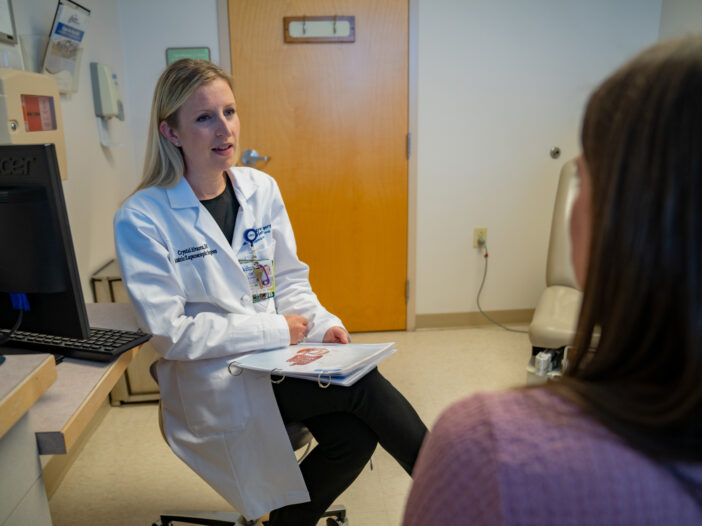
After attending an information session, you’ll schedule an initial evaluation with a surgeon and the rest of the bariatric team. During this appointment, you will complete a full physical and record your medical and surgical history. If you are a candidate for weight loss surgery, you’ll undergo a series of medical screenings, attend a pre–operative nutrition screening and diet counseling and pre-operative behavioral health screening,
At this time, a letter will be sent to your insurance company to obtain approval for the operation. The approval process can take from a few weeks to a few months, depending on your insurance company.
Initial Evaluation for Bariatric Surgery
During your initial evaluation your surgeon will complete a full physical and record your medical and surgical history. The surgeon will also determine what tests and other medical clearance you will need to complete the program. These tests are evaluating your obesity related diseases and to make sure you are healthy enough to have surgery. Some medical problems may mean you are not a candidate for surgery.
Some of the pre-operative tests that may be required include:
- Abdominal Ultrasound
- A complete set of blood work
- Cardiac Clearance
- Chest x-ray
- Electrocardiogram (EKG)
- Echocardiogram (Echo)
- Medical Clearance
- Pulmonary Function Tests
- Sleep Study
- Endoscopy (EGD)
- Upper gastrointestinal (GI) evaluation
- Computerized Tomography (CT) scan
Pre-operative Behavioral Health Screening for Bariatric Surgery
Surgical treatment for obesity changes a person’s relationship with food. Therefore, it is essential as part of the pre-operative assessment process that you undergo a psychological evaluation. This evaluation is performed by our licensed clinical social workers to determine if bariatric surgery is appropriate for you. Your assessment will be looking at:
- Psychiatric history
- Current psychological function
- Weight and dieting history
- Current eating behaviors
- Level of physical activity
During the evaluation, you are also educated on the behavioral changes necessary to ensure good post-operative results, as well as any psychological changes that can be anticipated after surgery. Your initial evaluation may determine that you will need further appointments before being ready for surgery.
Pre-operative Nutrition Screening and Diet Counseling for Bariatric Surgery
Our pre-operative nutrition screening is focused on changing your eating behaviors and food selection practices. This helps you more easily adjust to your post-operative diet and achieve the best results possible from bariatric surgery. During nutrition screening, a dietitian from our team will evaluate your weight loss history and current eating behaviors using a weight and diet history questionnaire. You will then have a series of appointments to complete dietician modules. You will need to make certain changes to your food behaviors in order to be ready for surgery.
Most insurance companies require six months of supervised weight loss, called Medical Weight Management. At each of these monthly visits, you will meet with a dietitian to work towards completing all the testing required before surgery and preparing for all the dietary and behavior changes that come with surgery.
Last Steps before Surgery
All of the testing you completed is sent to your insurance company for pre-authorization. You will work with our Insurance & Surgery Coordinator to then determine a surgery date and schedule pre-op and post-op visits.
Surgery
All bariatric surgeries require general anesthesia. Surgeries are performed using small incisions either laparoscopically or robotically. The hospital stay is usually one to two nights. Patients will start a liquid diet in the hospital and be walking in the halls.
Recovery
Patients should avoid lifting more than 10-25 pounds for four to six weeks after surgery and avoid abdominal exercises for six to eight weeks after surgery. Typical surgical follow up visits are at two weeks, six weeks and three months after surgery.
Long Term
Lifelong follow up is required. Usual follow up visits are at six months, one year, and annually after surgery. At these visits, you will meet with the physician assistant and a dietician. The goal of these visits is to help you stay on track with your weight loss and prevent weight regain, nutrition deficiencies or late complications from surgery.
New Patient Questionnaire Packet
Before you arrive at your initial consult visit with the surgeon, please print and fill out the New Patient Questionnaire Packet below. You will need to bring the following items with you to the first appointment:
- The new patient questionnaire packet
- Your insurance card
- Copy of your medication list, including any over the counter medications you take
- Copayment if indicated
You must bring the below new patient questionnaire packet completed with you to your first appointment in order to be seen.
